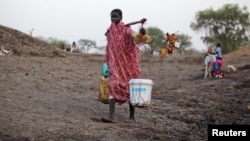GENEVA - The U.N. refugee agency says global conflicts in 2011 forced a record 800,000 people to flee across borders. The UNHCR’s 2011 Global Trends Report tracks the extent of refugee and internal displacement worldwide. It finds more people became refugees last year than at any time since the beginning of this century. The report is being released in advance of World Refugee Day on June 20.
The United Nations High Commissioner for Refugees says there were 42.5 million refugees, internally displaced persons and asylum seekers, at the end of 2011. For the first time, the report details the extent of forced displacements from a string of humanitarian and political crises that began in late 2010 in Ivory Coast.
This, it says, was quickly followed by popular protests against corrupt dictatorships in Tunisia, Libya, Egypt and Syria. The turmoil caused by the Arab Spring was matched, and in many ways exceeded, by the crisis of drought and famine in the Horn of Africa that affected more than 12 million people.
Key Refugee Figures
Key Refugee Figures- 42.5 million people are forcibly displaced worldwide
- 4.3 million people were newly displaced in 2011
- 46% of refugees are under 18 years old
- Afghanistan is the leading country of origin for refugees
- Pakistan is host to the most refugees in the world
- 532,000 refugees repatriated voluntarily in 2011
Source: UNHCR
U.N. High Commissioner for Refugees Antonio Guterres says the people uprooted by these catastrophic events represent human suffering on an epic scale. Unfortunately, he says, 2012 does not look more auspicious than 2011.
“I do not remember in my tenure as High Commissioner to have at the same time, three acute, massive refugee crises as we are having today in Syria, in Sudan-South Sudan, and in Mali. We already have more than 80,000 refugees coming out of Syria, 190,000 refugees coming out of Sudan into the South and into Ethiopia, and 160,000 refugees coming out of Mali into Mauritania, Niger and Burkina Faso-not to mention a small number into Algeria," he said.
The report traces several worrying trends during the past 10 years. One is that forced displacement is affecting larger numbers of people globally. Another is that a person who becomes a refugee is likely to remain one for many years.
The report notes almost three quarters of the 10.4 million refugees under UNHCR’s mandate have been in protracted exile for at least five years.
High Commissioner Guterres says that contrary to widely held perceptions in industrialized countries, 80 percent of the world’s refugees are being hosted in developing countries.
He says the presence of hundreds of thousands of refugees in these poor countries has an enormous impact on their economies and in their societies.
“I do not like to talk about the word burden because this is something that countries are doing in a brotherly way, opening their borders, opening the doors of their cities, sometimes opening their hearts to support people in need. But, we have to recognize that for countries that face very difficult economic situations with low levels of development, this presence represents a huge impact. And, that impact requires a lot of international solidarity-not only in economic development cooperation, but also in offering more resettlement opportunities in the developed world," he said.
Guterres says last year, only 60,000 refugees were resettled from countries of asylum to countries in the industrialized world. Most were resettled in the United States, followed by Canada and Australia.
The report says Afghanistan remains the biggest producer of refugees with 2.7 million people living in exile, followed by Iraq, Somalia, Sudan and Democratic Republic of the Congo.
The report notes an estimated 12 million stateless people worldwide continue to be deprived of the most basic benefits and rights accorded to citizens of a country.












